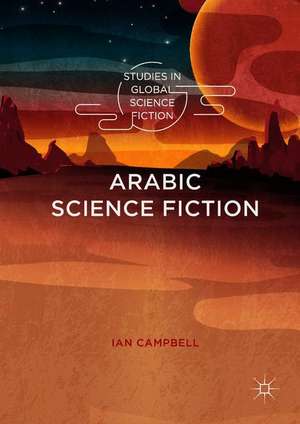Arabic Science Fiction: Studies in Global Science Fiction
Autor Ian Campbellen Limba Engleză Hardback – 6 iun 2018
| Toate formatele și edițiile | Preț | Express |
|---|---|---|
| Paperback (1) | 635.02 lei 6-8 săpt. | |
| Springer International Publishing – 5 ian 2019 | 635.02 lei 6-8 săpt. | |
| Hardback (1) | 640.40 lei 6-8 săpt. | |
| Springer International Publishing – 6 iun 2018 | 640.40 lei 6-8 săpt. |
Preț: 640.40 lei
Preț vechi: 753.41 lei
-15% Nou
Puncte Express: 961
Preț estimativ în valută:
122.65€ • 126.36$ • 102.74£
122.65€ • 126.36$ • 102.74£
Carte tipărită la comandă
Livrare economică 24 februarie-10 martie
Preluare comenzi: 021 569.72.76
Specificații
ISBN-13: 9783319914329
ISBN-10: 3319914324
Pagini: 278
Ilustrații: XI, 322 p.
Dimensiuni: 148 x 210 mm
Greutate: 0.55 kg
Ediția:1st ed. 2018
Editura: Springer International Publishing
Colecția Palgrave Macmillan
Seria Studies in Global Science Fiction
Locul publicării:Cham, Switzerland
ISBN-10: 3319914324
Pagini: 278
Ilustrații: XI, 322 p.
Dimensiuni: 148 x 210 mm
Greutate: 0.55 kg
Ediția:1st ed. 2018
Editura: Springer International Publishing
Colecția Palgrave Macmillan
Seria Studies in Global Science Fiction
Locul publicării:Cham, Switzerland
Cuprins
Chapter 1:Introduction.- Chapter 2: Postcolonial Literature and Arabic SF.- Chapter 3: Arabic SF: Definitions and Origins.- Chapter 4: Criticism and Theory of Arabic SF.- Chapter 5: Double Estrangement in Nihād Sharīf’s The Conqueror of Time.- Chapter 6: Continuity Within Rupture in Two Novels by Muṣṭafā Maḥmūd.- Chapter 7: “Utopia” as a Critique of Utopia in Ṣabrī Mūsā’s The Gentleman from the Spinach Field.- Chapter 8: Male Gaze as Colonial Gaze in ’Aḥmad ‘Abd al-Salām al-Baqqāli’s The Blue Flood.- Chapter 9: Mysticism and SF in Ṭālib ‘Umrān’s Beyond The Veil of Time.- Chapter 10: Inheritance and Intertextuality in a Three-Novel Series by Ṭība ’Aḥmad Ibrāhīm.- Chapter 11: Conclusion.
Recenzii
“For the scholar, Campbell’s study does an excellent job of exploring how works of ASF from a range of different countries (Kuwait, Egypt, Syria) have approached the literary demands and political risks of writing speculative fiction meant to critique the existing regimes and cultural programs. … scholars who want to understand the specific challenges of the emergence of science fiction in postcolonial settings would do well to explore Campbell’s volume.” (Steven Holmes, SFRA Review, Vol. 50 (1), 2020)
“Arabic Science Fiction responds to the growing interest that both readers and scholars have been experimenting towards for the last two decades of non-Western science-fiction. … Arabic Science Fiction constitutes a valuable contribution to the growing field of science fiction postcolonial studies, opening the path for more widespread exploration of the genre, and perhaps eventually encouraging the translation of a body of fiction unheard of in the West.” (Erica Couto-Ferreira, Journal of Science Fiction, Vol. 3 (3), December, 2019)
“Arabic Science Fiction remains a significant pioneering work. It contains many interesting analyses and genuinely insightful arguments. Along with earlier research, it definitely sets the stage for further engagement in the field. And for this reason, I think it should be on the bookshelf of anyone interested in the topic.” (Musab Bajaber, Science Fiction Studies, Vol. 46, 2019)
Notă biografică
Ian Campbell is Associate Professor of Arabic and Comparative Literature at Georgia State University, USA. He has published articles in major science fiction journals on Arabic science fiction and also undertakes research in postcolonial Moroccan fiction. He is the author of Labyrinths, Intellectuals and the Revolution: The Arabic-Language Moroccan Novel, 1957–72 (2013).
Textul de pe ultima copertă
This book traces the roots of Arabic science fiction through classical and medieval Arabic literature, undertaking close readings of formative texts of Arabic science fiction via a critical framework developed from the work of Western critics of Western science fiction, Arab critics of Arabic science fiction and postcolonial theorists of literature. Ian Campbell investigates the ways in which Arabic science fiction engages with a theoretical concept he terms “double estrangement” wherein these texts provide social or political criticism through estrangement and simultaneously critique their own societies’ inability or refusal to engage in the sort of modernization that would lead the Arab world back to leadership in science and technology.
Caracteristici
Provides a nuanced and comprehensive study of Arabic science fiction Contributes to postcolonial literary studies, genre studies and Arabic literature Extends research on global science fiction












